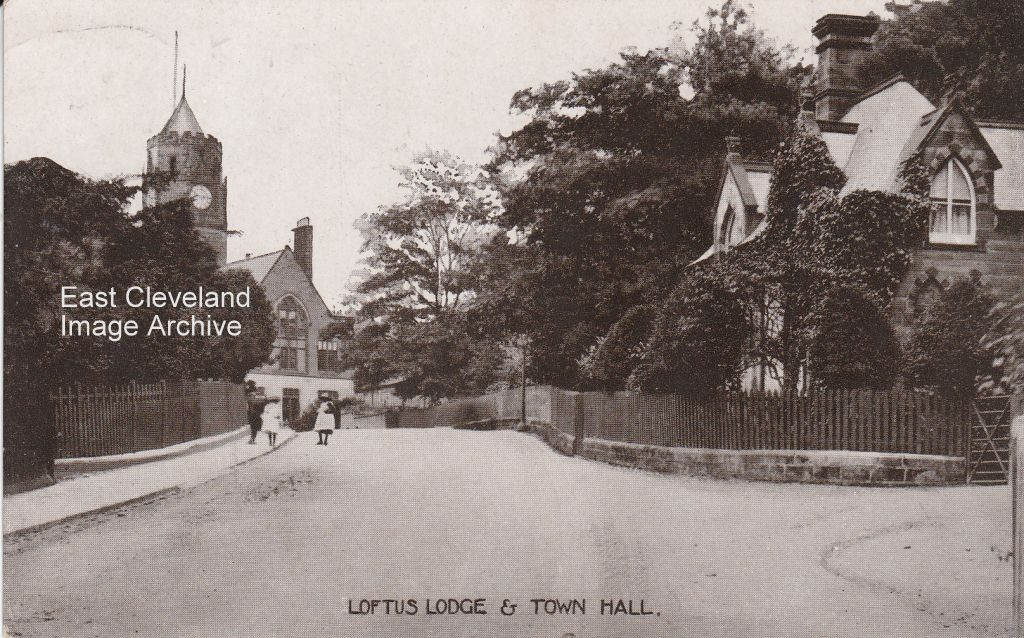
Another postcard from the John Thomas Ross photographer and postcard producer of Whitby; f Hall Lodge and the Town Hall taken from the usual vantage point.
Image courtesy of Ruth Wilcock.
|
|
||
|
Another postcard from the John Thomas Ross photographer and postcard producer of Whitby; f Hall Lodge and the Town Hall taken from the usual vantage point. Image courtesy of Ruth Wilcock.
One of my favourite photographs although not as clear as it might be; the lodge house entrance to Hall Grounds, Loftus. It hasn’t changed much over the years.
Men of the last shift at Loftus Mine pose with their handiwork. The closing of the mines destabilised a lot of the local communities as people drifted away to find new jobs and eventually moved to be nearer their new place of work. Back Row: Allan Creswick, Harold Found, Cyril Gibson (blacksmith’s striker), Walter Wilson, Bill Dawson, Don Breckon. Front Row: Jim Tinkler, Walt Sayers (check weighman), George Adamson, Harold Ralph ‘Lal’ Gibson (blacksmith), Jim Easton (holder of the Daily Herald Award for Industrial Heroism for rescuing Jim Tinkler in an incident which witnessed the death of Jim Trousdale), Allan Readman. Thanks to Eric Johnson, Joanne Cooper and Cazzi Kerr for names.
This is an early image of Margrove Park Mine or Magra as it is still known locally. In front of the wooden headgear over the downcast shaft you can see the top of the upcast shaft with the smoke coming from the fire at its base to induce ventilation in the mine. This shaft top was later heightened and a pulley wheel installed on the top; this is now the structure which still survives on the site. The mine closed about 1924; it stood on the site of the present day Caravan Park and connected to the Boosbeck to Middlesbrough railway via a single track which crossed the road from Charltons to Boosbeck with a gated crossing. The village of Margrove Park; known as Magra Park – after the deer park which was here originally – was built in a large rectangle, one side of which was the local shops – all of which were demolished due to mining subsidence (after the mine had closed and they fell into disuse). The only remaining example of a shop (the Co-operative) is the pre-fab building on the opposite side of the road to the village garden. Bob Clements tells us: ”The railway crossing at Magra was a gated crossing. The gates were still there when I was a lad at Magra. That was in the 1940s. I can’t remember when they finally disappeared.” Helen commented: “I have just been walking around this area and found a cordoned off mine shafts in the woods behind the caravan park, but couldn’t tell my younger sister if it was a mine shaft or not!” Thanks to Simon Chapman for comments and corrections, also Bob Clements for the update on the gates and Helen regarding the former shafts.
A beautiful portrait of Dyson Nutt in his later years. This Loftus worthy was born in 1844 and was a familiar figure around Loftus as he fulfilled his various duties to the Council. During his life in Loftus he lived in several different houses in Loftus, including Westfield Terrace and the Georgian pillard house in the Market Place. He lies in Loy Lane Cemetery, whose burials he oversaw for most of his working life.
We’ve wondered about this one for a long time; having just found a similar image in Jean Wiggin’s book, ’Loftus in old picture postcards’ and cross-checked the hall out in Street View on Google Earth. It’s hard to recognise now, with Hall Grounds built up all round it, but the hall itself remains very much as it is in this picture. The image came from a printed selection by J. Richardson of Loftus, although as yet have not defined a date of publication. Image courtesy of the Pem Holliday Collection.
You can hardly see the works, but they are here – early construction image.
This time it’s Ronnie Patton and Louis McGuire, I am sure most older Loftus people can pick out Betty McGuire, second right, cheeriest postwoman ever. ”Tie-Pin Ted” is also in the photograph, who I am told was one of four Winspear brothers who lived at Liverton Mines. Louis’s father stands next to her and her cousin Beatrice, next to him. Two of the lovely small bridesmaids were Rosalie and Margaret Patton.
Still very early days, but it’s beginning to take shape.
The beginning of the end for Street Houses; the image is taken from a Northern Echo newspaper cutting, we continue to hope for an improved version!. |
||
Recent Comments